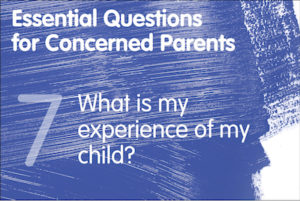 You know your child. Was he or she pretty happy until the divorce and have things changed dramatically since then? Did he or she give you sly looks even at one year of age—was he or she an impish trickster even then?
You know your child. Was he or she pretty happy until the divorce and have things changed dramatically since then? Did he or she give you sly looks even at one year of age—was he or she an impish trickster even then?
Was there some part of your child’s brain that just hated things being out of order, such that he or she had a tantrum—even a full-fledged meltdown—if something happened out of sequence? Did your child startle easily from birth? Did your child always sleep erratically? Did your child go through periods of eating everything and then eating next to nothing? You know a lot about this odd, wonderful, wild creature, don’t you?
Couldn’t you have predicted that the way your two-year-old stepped boldly and recklessly off into space on playground structures might turn into bold, reckless and impulsive adolescent behaviors? Didn’t you sense that your child would always be socially anxious and a bit of a loner? If a supposed expert now wants to bundle together certain of your child’s behaviors and ways of being and call that bundle a mental disorder, a mental illness or a mental disease, don’t you know better than to quickly nod and agree? If the claim that a supposed expert makes is at odds with what you know to be true about your child, be careful about overriding your intuition and replacing it with someone else’s too-quick opinion.
*****
Read the Concerned Parents’ Project Introductory Post.
To get in touch or to share your feedback, please email us.
Read more on this topic
Interview: Alternative Children’s Mental Health
Defining a Mental Disorder Does Not Make It Exist
Visit Parent Resources for additional in-depth articles.














